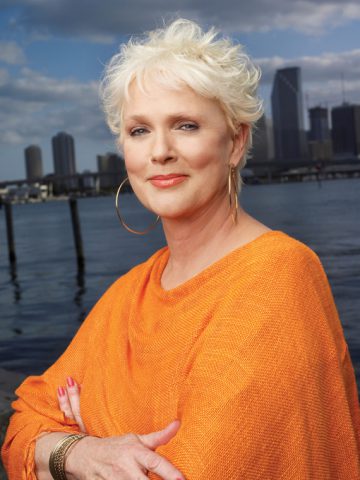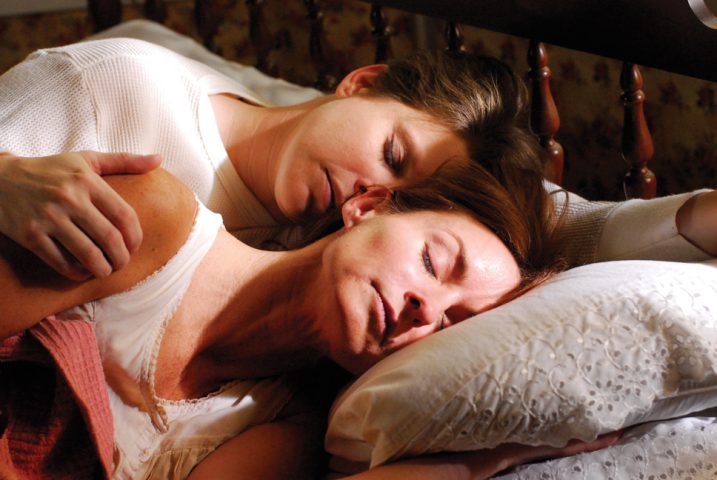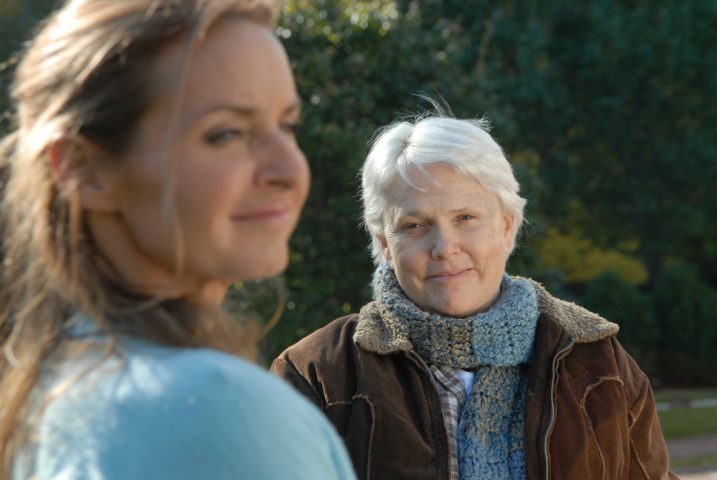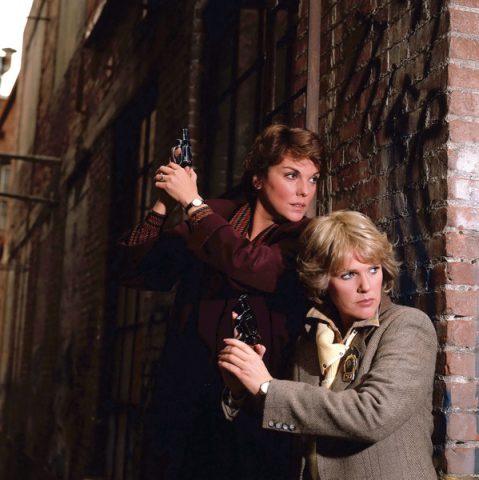GO:Your role in Hannah Free is a striking new addition to your reper- toire. What exactly drew you to the part, and what does this film mean to you?
SG: Hannah Free is especially important to me. It could have gone the other way where people said, ‘Who does she think she is, playing a lesbian and all?’ When [the role] was offered to me, I just took it immediately.
I mean this modestly—hopefully we all get better at what we do over time, if we have the luxury and opportunity to keep doing what we love. They’re still letting me do it.
How exactly did you initially get involved with the project, and what specifically convinced you that you could adequately represent Hannah Free?
The author Claudia Allen is a very well known and respected lesbian playwright in Chicago—she is a resident playwright at the Victory Garden Theater. She has written over 20 plays, some of them award- winning. Tyne Daly and I did a radio show of one her plays, then I went back and did a play she wrote for me on stage. She called me last year and said, ‘They are adapting one of my plays to film. You want to play it?’ I said, ‘Sure.’ And she said, ‘Don’t you want to know which one it is?’ I said, ‘No. But do I get to play a lesbian?’ And she said, ‘Absolutely!’ I said ‘Claudia, nobody writes women as well as you do.’
This production had a small budget and was shot in a short time. What was the experience like for you?
It was a true gift. In the month of November we filmed it in 18 days for $200,000. A first for a lot of us—first-time director, first-time pro- ducer, and my first time playing the title role in a feature. Over 30% of the crew worked for free.The Chicago lesbian community just rallied for us.
Because it was originally a play, we staged it all in one location and I thought it worked well for a first-time adaptation to film. And now Claudia has been asked to write the novel as well.
A recent YouTube viewer who commented on the Hannah Free trailer said, “I’ve waited my whole life to see Sharon Gless play a lesbian—instead of her just playing one in my head!”
I think that’s fabulous! After Cagney and Lacey, I realized that I had a large lesbian fan following. I really started getting into it and the lives of the people. And with Queer As Folk, the more I learned, the more I wanted to play a lesbian character. I wanted to do a series as a lesbian and they wouldn’t let me. There was the L Word, but that isn’t quite what I meant. It was a nice series, but it was more of a Victoria’s Secret catalog. Queer As Folk had some depth. It was necessary because it was the first step.
In fact, years before any of these shows, I always wanted to do a series playing a lesbian character, and man, the networks wouldn’t hear of it. I think Queer As Folk really changed all that. Hopefully there will be a really dramatic series next.
You attended two single-sex schools in your youth. Did you notice any lesbian hanky-panky?
From 7th through 12th grades I went to an all-girls school, but no one even heard of lesbians in those days. Or at least I hadn’t. I didn’t go to schools where it came up. I have two friends that went to boarding school with me who have since come out, but it wasn’t mentioned in those days. And neither of them acted on it then. I’m talking about the ‘50s and ‘60s, it was much different [than today].
When you were playing Chris Cagney, did you know that some people assumed she was gay, and that by extension you were too?
I was aware that people thought Cagney was gay and even more aware of the fact that they thought I was gay. The press was always asking me if I was gay. And I would tell them, ‘I would tell you if I were gay.’ I would tell them that I’m festive, but I’m not gay. Now I wish I was gay, because you guys have much more fun than we do. I wasn’t aware that people thought Tyne was gay. I never understood how they could think that her character Mary Beth Lacey was gay.
Someone did a cleverly put-together YouTube video proving the case that Cagney was really gay and in love with Mary Beth Lacey. And if you watch only this video with only these scenes, I understand how someone would say they were gay and were together!
I still think Cagney was the most wonderful role ever written for a woman—a raging alcoholic, petulant, a bad ass and so imperfect.
Have any real life LGBT folks inspired or affected your choice of roles throughout your career?
No, not really. I went after Queer As Folk and Debbie Novotny. I called Showtime and told them I wanted to play it. Someone sneaked me the script. When I was in Chicago doing Claudia Allen’s play on stage, I was studying with a drama coach for another role I was supposed to be playing, and he got a copy of Queer As Folk and sent it to me. I read the part and told Showtime I wanted this part. It was so daring at the time, especially for the boys and girls they signed. And they did that blatant sex that actually titillated me! We were expecting a huge backlash from the Christian Right—I was so disappointed because the night we aired, the Bush elec- tion was being recounted in Florida, so we were ignored.
Did you have any doubts about playing Debbie Novotny?
My husband had a problem with it. Not because it was a gay show, but he said, ‘How can you look like that on television?’ And I said, ‘I’m overweight. And I need to wear the wig because if I don’t, I look like Chris Cagney gone bad.’ I needed to reinvent the look. When Debbie came on the air the boys went crazy. They loved it. And I felt so protected with the reaction to that character. I designed the look.
Do Queer as Folk fans still approach you about playing Debbie?
Yes, they do, especially the boys.They always tell me that they wish they had a mom like that. Or some of them say, ‘I have a mom just like Debbie.’ I like it because I think it opened up doors for parents, especially of gay boys, to know who they are and realize that love is a viable response to your child being gay. It is about love. Just like Hannah Free is about love, having to return home because it is about the heart.
As a fifth-generation Los Angeleno, what are your feelings about Prop 8?
I have nieces and nephews who are sixth- and seventh-generation natives of Los Angeles. Ever since Prop 8 passed, for the first time in my life, I am ashamed of my state. It will change. I think sometimes shows like Queer As Folk and movies like Hannah Free make the people who are angry even more angry and riled up.
This is what‘s interesting about Hannah Free: we start in the Depression era, with the char- acters having to hide their feelings and lives. Later on, in modern-day life, they still couldn’t be together in the hospital because the laws haven’t changed.
So when exactly is Hannah Free going to be ready for public viewing?
It will be out in theaters in L.A. for consideration for the Independent Spirit Awards, and then out on DVD. We didn’t have enough money for distribution. But if enough people support it, then we can make another film!
In Burn Notice on USA, you play a different kind of mother to a different kind of Michael. Tell us about that role.
It’s loads of fun. I get to play the chain-smoking mother from hell. At the end of the day, I’m grateful they still let me do it. I come from gratitude every day.
What projects are in your future?
I’m doing a play in San Francisco. A property I optioned, A Round-Heeled Woman, tells the story of a woman who has round heels and teaches English in the Berkeley school system. She takes out an ad in the New York Review of Books because she wants to meet an intellectual like herself. And the ad she places says, ‘Before I turn 60 I want to have a lot of sex with a man I like.’ She hasn’t been touched by another human being in 30 years. It is about her journey of self-discovery. If it does well in San Francisco, we’ll try to take it to New York, and then on to the West End in London





What Do You Think?